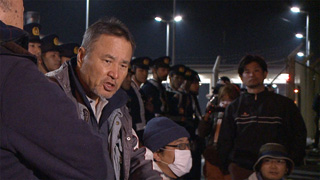We Shall Overcome
(Ikusaba nu tudumi) JAPAN / 2015 / Japanese / Color / DCP / 129 min
JAPAN / 2015 / Japanese / Color / DCP / 129 min
Director: Mikami Chie
Photography: Okubo Chizuna
Editing: Aoki Takafumi
Assistant Director: Tobaru Hideki
Music: Komuro Hitoshi
Narration: Cocco
Producers: Hashimoto Yoshiko, Kinoshita Shigeki
World Sales: TOFOO, LLC.
www.ikusaba.com/en/
Seventy-four percent of all U.S. military bases in Japan are crowded onto the islands of Okinawa. In December 2014, Onaga Takeshi wins election for governor, promising to oppose the plan to fill in the ocean and construct a new military base in Henoko, through an “all-island struggle” including both conservative and liberal forces. Survivor of the 1945 battle of Okinawa, eighty-five-year-old obaa (an affectionate word in Okinawa for elderly woman) Fumiko joins the protest movement and lays her body in front of construction trucks. The filmmaker hears out not only Fumiko’s inner thoughts, but also the complex emotions of the Okinawan people who have been forced to live side-by-side with the bases. Observing the bounty of traditional lifestyle and culture, the film pays attention to the songs and humor that politics cannot silence. The sincerity of the people’s demands for an end to ikusa (war) resonates strongly.
[Director’s Statement] Our islands of Okinawa are situated on the southernmost end of Japan—closer to Taiwan than to mainland Japan. Today, the archipelago’s beautiful coral reefs make it a tourist destination. However, this was the site of an intense ground war that took the lives of one out of every four local civilians at the end of World War II. Okinawa was returned to Japan after twenty-seven years of U.S. occupation, but a heavy presence of Japanese and American military forces remains stationed here to this day.
In 2014, the building of a new U.S. military base in Henoko began, amidst strong protest from Okinawans. People have rushed daily to the gates of the base and to the sea to demand a halt to the construction, but the Japanese government dispatches riot police and coast guards to forcibly expel them. For seventy years since the end of World War II, Okinawa has had to accompany the U.S. in its war-mongering. The Okinawan people have continuously expressed their weariness with war and called for peace at last, but their voices have always been silenced, with the Japan-U.S. security treaty as an excuse.
Then in 2014, people joined across political party lines. They rose up in a showdown against crushing authority, unleashing the generous and resilient power of song, dance, and laughter to conquer a painful struggle—often singing We Shall Overcome.
All around the world, there are people fighting against absolute authority. But we have found that human ties can be reclaimed, even when geography divides us or someone tries to silence us. When the powers that be try to turn us against one other, it is hope that allows us to come together as a human race. Our battle in Okinawa is rich with such stories of courage. I am deeply grateful for this opportunity to communicate this truth to the world, to an international audience who may know Japan but not Okinawa.
 Mikami Chie
Mikami ChieJournalist, filmmaker. Mikami joined Mainichi Broadcasting System as an announcer in 1987. In 1995 she moved to Okinawa for the launch of Ryukyu Asahi Broadcasting Corp. While working as main anchor for the local news program Station Q, she produced many documentary programs about Okinawan culture, nature, and society including Sitting by the Sea: The 600-Day Battle of Henoko, and To Die a Hero, or to Die a Dog? In 2010 she received the Women in Broadcasting Award from the Society of Japanese Women in Radio and Television. The television version of The Targeted Village won many prizes including the Grand Prize at the ZA-Koenji Documentary Film Festival. The theatrical version (2013) was chosen by Kinema Junpo as Best Cultural Film of the year, and at YIDFF 2013 it won the Directors Guild of Japan Award and Citizen’s Prize. She currently works freelance as a journalist and filmmaker, and teaches Okinawan folklore at Okinawa International University as an adjunct professor.
